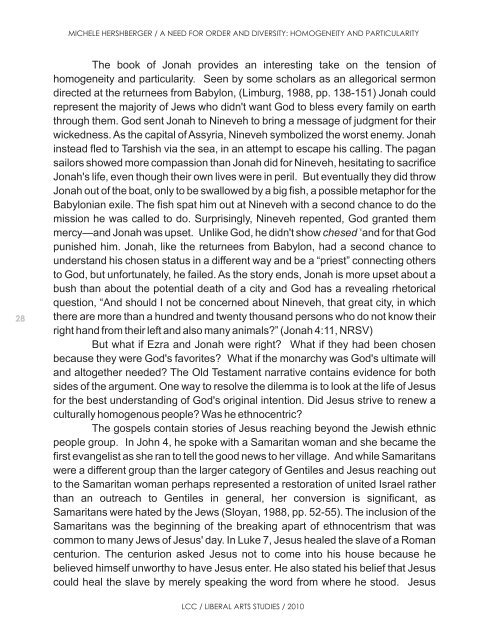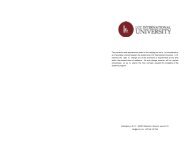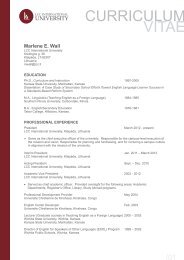lcc liberal arts studies / 2010 volume iii - LCC International University
lcc liberal arts studies / 2010 volume iii - LCC International University
lcc liberal arts studies / 2010 volume iii - LCC International University
Create successful ePaper yourself
Turn your PDF publications into a flip-book with our unique Google optimized e-Paper software.
28<br />
MICHELE HERSHBERGER / A NEED FOR ORDER AND DIVERSITY: HOMOGENEITY AND PARTICULARITY<br />
The book of Jonah provides an interesting take on the tension of<br />
homogeneity and particularity. Seen by some scholars as an allegorical sermon<br />
directed at the returnees from Babylon, (Limburg, 1988, pp. 138-151) Jonah could<br />
represent the majority of Jews who didn't want God to bless every family on earth<br />
through them. God sent Jonah to Nineveh to bring a message of judgment for their<br />
wickedness. As the capital of Assyria, Nineveh symbolized the worst enemy. Jonah<br />
instead fled to Tarshish via the sea, in an attempt to escape his calling. The pagan<br />
sailors showed more compassion than Jonah did for Nineveh, hesitating to sacrifice<br />
Jonah's life, even though their own lives were in peril. But eventually they did throw<br />
Jonah out of the boat, only to be swallowed by a big fish, a possible metaphor for the<br />
Babylonian exile. The fish spat him out at Nineveh with a second chance to do the<br />
mission he was called to do. Surprisingly, Nineveh repented, God granted them<br />
v<br />
mercy—and Jonah was upset. Unlike God, he didn't show chesed and for that God<br />
punished him. Jonah, like the returnees from Babylon, had a second chance to<br />
understand his chosen status in a different way and be a “priest” connecting others<br />
to God, but unfortunately, he failed. As the story ends, Jonah is more upset about a<br />
bush than about the potential death of a city and God has a revealing rhetorical<br />
question, “And should I not be concerned about Nineveh, that great city, in which<br />
there are more than a hundred and twenty thousand persons who do not know their<br />
right hand from their left and also many animals?” (Jonah 4:11, NRSV)<br />
But what if Ezra and Jonah were right? What if they had been chosen<br />
because they were God's favorites? What if the monarchy was God's ultimate will<br />
and altogether needed? The Old Testament narrative contains evidence for both<br />
sides of the argument. One way to resolve the dilemma is to look at the life of Jesus<br />
for the best understanding of God's original intention. Did Jesus strive to renew a<br />
culturally homogenous people? Was he ethnocentric?<br />
The gospels contain stories of Jesus reaching beyond the Jewish ethnic<br />
people group. In John 4, he spoke with a Samaritan woman and she became the<br />
first evangelist as she ran to tell the good news to her village. And while Samaritans<br />
were a different group than the larger category of Gentiles and Jesus reaching out<br />
to the Samaritan woman perhaps represented a restoration of united Israel rather<br />
than an outreach to Gentiles in general, her conversion is significant, as<br />
Samaritans were hated by the Jews (Sloyan, 1988, pp. 52-55). The inclusion of the<br />
Samaritans was the beginning of the breaking apart of ethnocentrism that was<br />
common to many Jews of Jesus' day. In Luke 7, Jesus healed the slave of a Roman<br />
centurion. The centurion asked Jesus not to come into his house because he<br />
believed himself unworthy to have Jesus enter. He also stated his belief that Jesus<br />
could heal the slave by merely speaking the word from where he stood. Jesus<br />
<strong>LCC</strong> / LIBERAL ARTS STUDIES / <strong>2010</strong>






